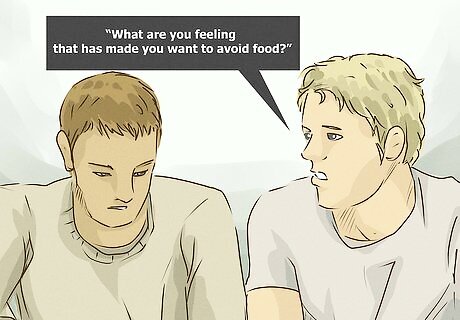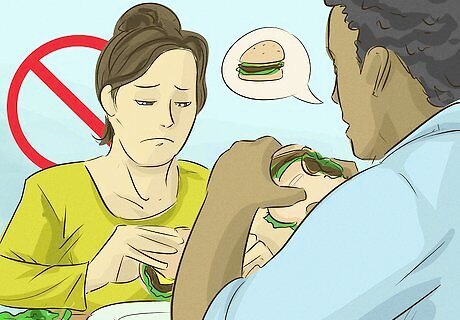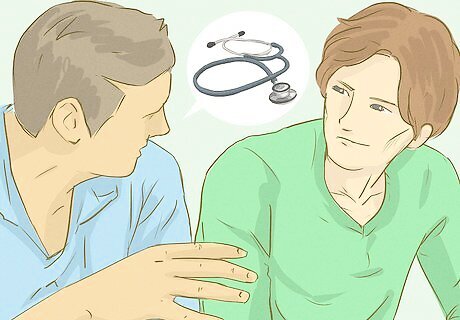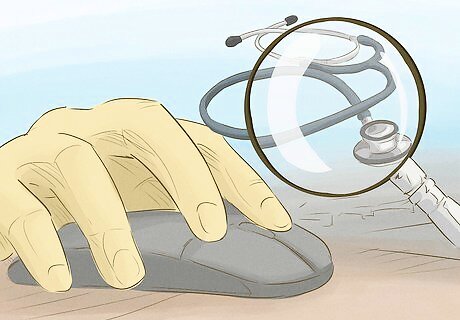
views
Discussing Your Concerns

Plan to talk when the person will be relaxed. Planning the discussion for a time when the person is likely to be relaxed and in a good mood will improve the chances that the conversation will go well. Avoid trying to talk to the person when you know that they will be stressed or preoccupied. For example, avoid raising your concerns when the person is trying to get ready for work or school. Instead, arrange to talk to them on the weekend or a couple hours after they have gotten off work or arrived home from school. The conversation may also go better if you plan to have it somewhere that the person will feel safe and comfortable, such as at home in your living room or at a favorite cafe.

Express your concerns in an honest, direct way. When you talk to the person, make sure that you are open and honest with them about your concerns. Don’t hint at your concerns; say exactly what they are. Otherwise, the person may not get your meaning or may choose to ignore the hints. Say something to voice your concern, such as, “I am concerned because I have noticed that you are not eating.” Or say, “Your health is deteriorating and I am very worried about you.” Consider asking another concerned family member or friend to talk to the person with you. Having multiple people express concern can make more of an impact than just one voice.

Invite the person to express their feelings and reasons for avoiding food. Keep in mind that anorexia is not really about food. It is about feelings. There is something affecting the person’s emotions that is causing them to avoid eating. Try asking about their emotions, such as by saying, “How have you been feeling lately?” Understand that the person may not recognize they have an issue with food at all. They may see poor self-image as the problem, for example. Avoid placing emphasis on food. For example, don’t ask the person, “Why aren’t you eating any more?” Or, “What kinds of foods would you like to eat?”

Listen to the person as they share with you. After you have expressed your concerns, allow the person a chance to respond and offer their perspective. They may try to deny that they have a problem, or they may accept the situation. Either way, give the person your full attention while they talk and do not try to rush them. Put away all devices and turn off things that might distract you, such as the television or your computer. Make eye contact and nod your head to show you are paying attention. You can also make neutral statements to show you are listening, such as by saying, “mhmm,” “yes,” “I see,” and “go on.” Ask questions to get them to expand and/or clarify their meaning. For example, you could ask a question for clarity, such as, “It sounds like you are saying that you feel lonely since changing schools. Is that right?”

Be accepting and loving as you talk with the person about your concerns. It is important to avoid blame, shame, and judgment when you share your concerns with someone who might be anorexic. Instead, let your friend or family member know that you love and accept them no matter what, and that you only want to help them. Try saying something supportive, such as, “I love you for who you are and I care about your well-being,” or, “I want to help you because I love you.”
Fostering a Healthy Relationship with Food

Model a healthy attitude towards food and your body. If you are the person's parent, sibling, or friend, then it is important to model good behavior regarding food and your body image. Avoid skipping meals, excessive dieting, and making self-deprecating remarks about your appearance. Eat 3 meals per day and include healthy snacks as well. Don’t talk about calories or other nutritional aspects of the foods you choose. Just enjoy eating your meals. Say positive things about your body, such as, “I love my hair today!” or, “I like the way my legs look in these pants.”

Don’t force the person to eat. Trying to force the person to eat will likely make matters worse. Remember that anorexia is not a matter of disliking food or just choosing not to eat. It is a complex mental health issue. Avoid giving ultimatums, such as by saying things like, “You have to eat dinner or you can’t go to the dance,” or, “If you don’t eat lunch, I am not speaking to you for the rest of the day.” Don’t tell the person to “just eat” or to “snap out of it” either. Remember that they are not simply choosing not to eat. There is a lot going on emotionally that is causing them to avoid food.

Take over food preparation for the person, if possible. People with anorexia struggle with choosing what to eat and preparing their food. The whole experience of preparing something to eat is likely very stressful for your friend or family member. If you live with the person, then you may consider helping them by offering to take over food preparation tasks and even preparing their plate for them. This is referred to as the “magic plate” when used as a means to support someone with an eating disorder. Prepare breakfast, lunch, and dinner for the person and offer it to them on a plate or in a bowl. If possible, do not allow them to dish out their own serving because they will likely put much less food on their plate than they need. Sit with them while they eat and eat your meal during this time as well.

Let the person know you love and support them before each meal. Encourage them to eat by letting them know how much you love them and support them. This will help to fulfill the person’s emotional needs while they eat to meet their nutritional needs. Try saying something like, “I love you and I will not let you go hungry.” Or you could say, “I care about you too much to watch you suffer.”
Suggesting Professional Help

Offer to schedule a doctor's appointment for the person. It is important for your friend or family member to get a diagnosis from a doctor. This will help the person to see that the issue is affecting their health. Their doctor can then connect them with the resources they need to get better. You cannot force the person to see a doctor, but you can offer some gentle encouragement. Try saying something like, “I think that it would be a good idea for you to see your doctor and make sure that you are healthy. I can call your doctor and make an appointment for you if you like.” Or you could say, “When was your last physical? I could schedule one for you if it has been a while.”

Help them find a therapist who has experience treating eating disorders. Since anorexia is a mental health condition, your friend or family member will need to begin working with a therapist to get to the root of their problems. You can offer to help them find a therapist who has experience working with people who suffer from eating disorders. You may even offer to make the first appointment for them. Try saying something like, “Talking to someone who is knowledgeable about eating disorders could be helpful. Would you like me to help you find a therapist?” Or you could say, “Therapy is an important part of recovery from an eating disorder. Let’s look into local therapists who have experience helping people with eating disorders and make an appointment for you.”

Research in-patient treatment centers that might appeal to them. In some situations, in-patient treatment for anorexia may be required. Your friend or family member’s doctor can determine if this might be the best option for treatment. However, you can research in-patient treatment centers to give your friend or family member some options if their doctor recommends in-patient treatment. Look into eating disorder treatment programs in your region and outside of the area as well. Try to find a program that might appeal to the person if they are resistant to the idea. In severe cases, hospitalization may be required. This is usually the case when the person is severely malnourished, dehydrated, or experiencing an irregular heartbeat.




















Comments
0 comment